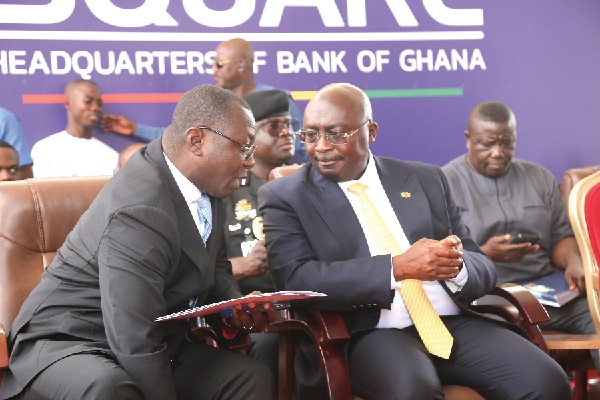Minister of Finance, Dr Mohammed Amin Adam, has credited President Nana Addo Dankwa Akufo-Addo for steering Ghana towards economic recovery, declaring that “the economy is getting stronger and stronger” under the president’s leadership.
Speaking during the commissioning of the new Bank of Ghana headquarters – the Bank Square – in Accra on Wednesday, the minister said all economic indicators were trending positively, with banks posting impressive financial performances and economic growth exceeding targets.
“Mr President, you have steered this economy to a strong economy,” Dr Adam stated. The newly unveiled Bank Square, constructed by Gold Key Properties, a fully Ghanaian-owned company, symbolises more than architectural achievement.
The minister described the edifice as a testament to local expertise, comparing it to “King Solomon’s temple” for its beauty and craftsmanship.
Beyond its aesthetic appeal, the building represents Ghana’s commitment to sustainability, featuring eco-friendly design elements, including renewable energy systems and advanced waste treatment facilities.
Rapid digitisation
The Minister in his speech also warned about the potential dangers lurking in the rapid digitisation of financial services.
He highlighted the double-edged nature of technological advancement, warning that the exponential growth of digital financial technologies brings significant risks alongside its transformative potential.
“The exponential growth of technology and digitisation has significantly expedited innovation but we must remain vigilant against emerging cyber threats, data privacy concerns and the potential misuse of financial technologies for illicit purposes,” he stated.
While cautioning about technological risks, Dr Amin Adams remained optimistic about Ghana’s financial future.
He positioned the country as a potential leader in Africa’s financial services industry, citing political stability, improving economic conditions, and the Bank of Ghana’s proactive approach to managing technological challenges.
“Through its proactive approach and sustained engagement with stakeholders, the Central Bank has continuously enhanced its effectiveness,” the minister emphasized.
The minister’s nuanced perspective suggests Ghana is taking a sophisticated approach to financial technology – embracing digital transformation while simultaneously developing sophisticated risk management strategies.
In his welcome address, the Governor of the Bank of Ghana, Dr Ernest Addison, said arguably, one of the most key economic achievements of the country, especially under the fourth republic, is the rapid growth and development of the financial sector.
Broadly, he said this was driven by the national drive to make Accra the financial gateway to the sub-region.
“This vision led to bold investments to transform this enclave of Accra into a financial hub. Your Excellency, I recall I raised the issue of a new headquarters of the Bank of Ghana with you in 2018, a vision which you shared and encouraged us to explore.
“I must say that this idea had been in the plans of the bank from the early 2000s. Since then, successive management teams and boards made different attempts to initiate processes to build a new head office.
However, each attempt was overcome by one challenge after another,” he noted. He added: “This attempt under your administration was not without difficulties, as this location was the subject of litigation.
However, your decision to issue an Executive Instrument to acquire the land for the Public Good—seeing this as a national monument—paved the way for this project to commence”.
He said over the past 67 years in operation, the core functions of the central bank have expanded, both in terms of scope and number of functions, following the fast-changing domestic economic landscape and increasing integration with the global financial architecture.
He mentioned that the scale of issuing and redeeming currency in the 1950s pales in comparison to the same operation in today’s economy.
“The number of regulated financial institutions has increased from less than five individual institutions in 1957 to over 830 institutions and across many institutional categories presently.
“The number of branches of regulated institutions, personnel and systems that must be supervised has expanded significantly and we cannot ignore the monumental evolution of banking services, the corresponding increase in the number of consumers of those services and technological advancements that have changed the financial service ecosystem in Ghana, bringing on board licensing and supervision of mobile money operators and Financial Technology firms (Fintechs),” he explained.
He said the BoG has multiple offices in the city of Accra, and with a strategic plan to harmonise all these operational units at the headquarters under one roof, this new head office provides it with the opportunity to better streamline its operations, improve communication, reduce costs and create the needed synergies for efficiency.



